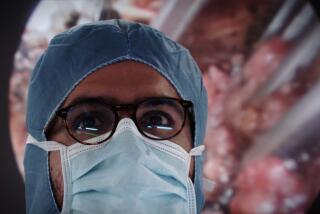‘Anatomy’ of cancer surgery
- Share via
“Grey’s Anatomy,” Thursday, Jan. 11 and 18, 9 p.m., “Six Days.”
---
The premise: Intern George O’Malley (T.R. Knight) is worried because his father, Harold, having recently undergone a heart operation (aortic valve replacement), is now having an operation for esophageal cancer. The doctors don’t know if the cancer has spread. Harold is told that the tumor won’t be removed if it is too extensive. Harold tells the surgeon, Dr. Richard Webber (James Pickens Jr.), that he wants the cancer removed no matter what. The operation reveals metastases to the stomach, lymph nodes and liver. Webber follows the patient’s wishes and performs an extensive operation. Postoperatively, Harold does poorly, requiring an emergency reintubation (insertion of a breathing tube), before going into kidney failure and dying. George wrestles with the fact that his father might have lived longer without surgery.
The medical questions: Must a surgeon wait for the operation to know how far a cancer has spread? Is it reasonable to remove metastases as well as the primary tumor? Would a resident perform an emergency intubation? Would Harold have lived longer without surgery?
The reality: Though cancer spread cannot be predicted with total accuracy before surgery, in Harold O’Malley’s case, the metastases were extensive and probably would have been found. A routine preoperative CT, MRI or PET scan would almost certainly have shown the lesion on the liver, and endoscopic ultrasound (often followed by a diagnostic fiber optic scope placed into the chest or abdomen) has an accuracy rate of close to 90% in showing regional node involvement. For this reason, exploratory laparotomies are rarely done these days, and in most cases a treatment strategy can be considered before surgery.
Patients sometimes benefit from the removal of isolated metastases, but studies on esophageal cancer have shown that having several lymph nodes involved reduces overall five-year survival to less than 5% regardless of treatment (including chemotherapy).
A surgeon is unlikely to agree to perform an extensive tumor-removing operation just because the patient insists on it. But George’s father probably would not have lived very long even without surgery, and in fact, chemotherapy after esophageal surgery has been shown to increase early mortality. Kidney failure is possible but is not a common result of this kind of tumor or surgery. Finally, a resident would be unlikely to insert a new tube without an anesthesiologist or an ear, nose and throat surgeon standing by.
Dr. Marc Siegel is an internist and an associate professor of medicine at New York University’s School of Medicine. He can be reached at marc@doctorsiegel.com.






